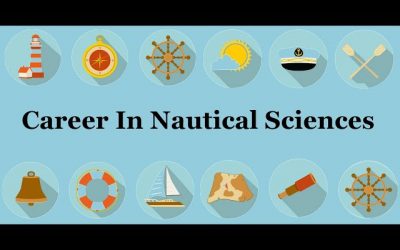What is Nautical Science?
An emerging career of this century, nautical science is for those who have a pull for the life in the sea. It is a highly paid industry and requires individuals who have the zest, inclination and courage to pursue a challenging career. The course provides a strong theoretical education in the field of nautical science and prepares students for employment in marine transportation. Students can perform the duties of ship officers.
When Can I Enroll for Nautical Science?
COURSES | ELIGIBILITY | DURATION | ENTRANCE EXAM |
B. S. Nautical Technology | HSC with PCM & English | 4 Years | Autonomous Exam |
B. Sc. Nautical Science | HSC with PCM & English | 3 Years | Autonomous Exam |
Higher National Diploma Program | 10+2 or its equivalent with 50% aggregate in Maths, Physics and Chemistry and minimum 50% marks in English | 2 Years | English Proficiency Test |
Diploma in Nautical Science (IGNOU) | a) Pass in (10+2) examination with Physics, Chemistry, Mathematics as separate subjects with a PCM average of not less than 55% OR | 1 Year | Autonomous Exam |
b) With Physics as individual subject in one of the year, B.Sc. in Physics, Mathematics, Chemistry or Electronics with an average of not less than 55% of marks in the final year OR | Autonomous Exam | ||
c) B.E./B. Tech. Degree from I.I.T. or from a college/University recognized by AICTE / UGC / DEC | Autonomous Exam |
What Personality Traits Are Required in the Field of Nautical Science?
- Risk taking ability
- Ability to work for long hours
- Enthusiastic
- Communication Skills
What Aptitude Are Required in the Field of Nautical Science?
- High Abstract Reasoning
- High Numerical Ability
- Above Average Verbal Ability
IQ Required for Being an Architect?
High intelligence level is required with lots of courage to take challenges.
Job Prospects in Nautical Science
- Educational and Training Institutions.
- Shipping Companies
- Mercantile Marine Department
- Ship Broking Firms
Frequently Asked Questions For Nautical Science
1. What do nautical science professionals do?
Nautical science professionals, such as deck officers or maritime officers, are responsible for navigating ships, ensuring the safety of the crew and cargo, and managing various aspects of maritime operations.
2. How can I become a qualified nautical science professional?
To become a nautical science professional, you typically need to complete a bachelor’s degree program in nautical science, maritime studies, or related fields, followed by practical training and certification.
3 What is the role of a deck officer?
A deck officer, also known as a navigation officer, is responsible for navigating the ship, charting courses, supervising the crew on deck, ensuring compliance with regulations, and managing safety protocols.
4. Are there different ranks or levels within nautical science careers?
Yes, nautical science careers often have different ranks, including cadet, third officer, second officer, and chief officer. These ranks signify varying levels of responsibility and experience.
5. How does technology impact nautical science?
Technology plays a significant role in modern nautical science, with advanced navigation systems, electronic charts, communication equipment, and safety devices enhancing the efficiency and safety of maritime operations.
6. What is involved in maritime safety training?
Maritime safety training covers areas like emergency response, firefighting, lifeboat handling, survival techniques, and first aid. It equips professionals to handle various safety scenarios at sea.
7. Can nautical science professionals work on different types of ships?
Yes, nautical science professionals can work on a range of vessels, including cargo ships, container ships, oil tankers, cruise ships, research vessels, and more.
8. How does nautical science contribute to marine environmental protection?
Nautical science professionals play a role in adhering to environmental regulations, implementing proper waste disposal practices, and minimizing the ecological impact of maritime activities.
9. What is the career outlook for nautical science professionals?
The career outlook for nautical science professionals is generally positive, with opportunities in shipping companies, offshore industries, maritime agencies, cruise lines, and more, as global trade and transport continue to grow.
10. Can I study nautical science online?
Some institutions offer online courses or blended learning options for nautical science theory components. However, practical training and onboard experiences are typically required to complete the degree.
11. What is the difference between nautical science and maritime studies?
Nautical science often focuses more on practical navigation and ship handling, while maritime studies might encompass broader aspects of the maritime industry, including law, economics, and management.
12. How does nautical science address challenges like piracy and maritime security?
Nautical science programs often include training in maritime security protocols, piracy prevention measures, and the use of technology to ensure the safety of crew and vessels in high-risk areas.
13. What are the responsibilities of a second officer in nautical science?
A second officer is typically responsible for navigation, watchkeeping, maintaining ship’s records, supervising crew activities, and assisting higher-ranking officers in overall ship management.
14. Is nautical science only for those interested in a seafaring career?
While nautical science is primarily associated with seafaring careers, the skills and knowledge gained in this field can also be applied to shoreside positions such as maritime education, maritime law, port operations, and maritime administration.
Nautical science is a specialized field that equips professionals with the expertise to safely navigate and manage ships while adhering to maritime regulations and ensuring the smooth operation of maritime activities.






